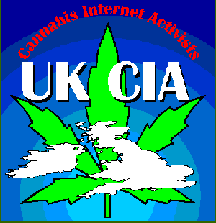The Federation of American Scientists (FAS) wants the US Government to allow and carry outresearch on the medical Cannabis issue, and it wants them to do it quickly.The US National Nurses Society on Addictions (NNSA) wants the government to make Cannabisavailable on prescription, supports all research and urges the American Nurses Association andother healthcare professional organisations to support patient access to the medicine. Their positionpaper was approved in May '95.
The US Virginia Nurses Association (VNA) was the first nurses' association to support medicalCannabis. At their October '94 meeting, they resolved to support "all reasonable efforts" to makeCannabis available for legitimate medical uses, to educate Virginia's nurses about the therapeuticuses of marijuana and the government prohibition of its use, to encourage other professional bodiesto support medical Cannabis and to submit similar resolutions to the American Nurses' Association.Online, you can find the VNA's position paper, a copy of the resolution and the ACT press releaseabout it.
36 US states have passed legislation recognising the therapeutic potential of Cannabis. Unfortunately,the US federal government laws prevent these laws from having any effect.
The California Medical Association have endorsed the prescriptive use of Cannabis for the treatmentof "life-threatening and sense-threatening diseases including AIDS, cancer and glaucoma."
When will there be research into medical Cannabis?
Everyone agress that more research is needed into the medical effectiveness and safety of Cannabis.Yet little or no research is actually carried out. Dr Philip Robson, a consultant psychiatrist and seniorclinical lecturer at the Warneford Hospital in Oxford wrote to The Times in early November '95 topoint out that "the controlled and co-ordinated studies which are required to clarify the potentialrisks ... and possible therapeutic applications ... can never be undertaken while the drug retains itscurrent legal status." For Dr Robson, the urgent need for research is "surely one of the mostcompelling reasons for discussing a change in the law."
Dr Roger Pertwee of the Biochemistry Department, Aberdeen University, who has been studyingCannabis for twenty five years, is hoping to set up a research-trial on the therapeutic effect of Cannabis onpatients with MS. Working with the Alliance for Cannabis Therapeutics he has devised a confidentialquestionnaire, which users have filled out; and now he would like to start clinical trials. Despite thefact that both the government and the MS society support more research, neither is willing to fund it.Dr Pertwee was forced to go public in August '95 to try and get funding and a legal source ofCannabis.
If the government is sincere about wanting more research it should fund it and make itlegally possible. Otherwise we can only conclude that it really doesn't want more research -perhaps because it knows that the results would undermine the years of War On Drugslies.
In California, many AIDS patients use Cannabis illegally to treat their wasting syndrome. Dr DonaldAbrams of the University of California, San Franciso wanted to carry out a clinical pilot study to findout whether inhaled marijuana has a benefit for AIDS patients, and whether it is safe for them to use.His plan was approved by the Food and Drug Administration, the university's review board, and theCalifornia Research Advisory Panel. The study was to be sponsored privately by MAPS, howeverDr Abrams could not obtain a legal supply of Cannabis. The DEA refused to allow him to importCannabis from Holland. He asked the National Institute on Drug Abuse for a legal supply, but heardnothing from them for nine months. Then in April '95, NIDA refused to supply Cannabis. NIDA haspreviously supplied Cannabis to every FDA-approved study.
All that Dr Abrams received was a short letter from Dr Leshner. In it, Lesher criticised the plan forthe study (even though it had been praised by other bodies) and offered no chance of discussion. Hesaid he sincerely hoped new treatments for AIDS could be found quickly. In Dr Abrams reply, waysof changing the plan were outlined and all the criticisms answered. Dr Abrams thought that thenine-month delay was "offensive and insulting" and that NIDA's sincerity was "so hypocritical itmakes me cringe." He concluded: "in the words of the AIDS activist community: SHAME!"
The whole affair has been publicised since. In NIDA Blocks Medical Marijuana Research, MAPS'director Rick Doblin summarised the affair and their responses to Leshner's criticism. Grinspoon,Bakalar and Doblin had a letter entitled "Marijuana, The AIDS Wasting Syndrome and the USGovernment" printed in the Sept 7th '95 issue of the New England Journal of Medicine. Theystated that the government was "creating obstacles that make research impossible to pursue."
